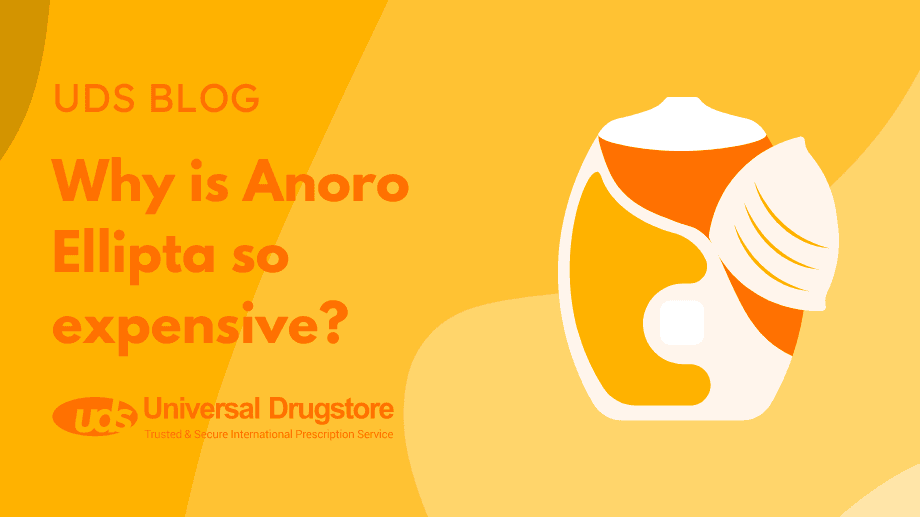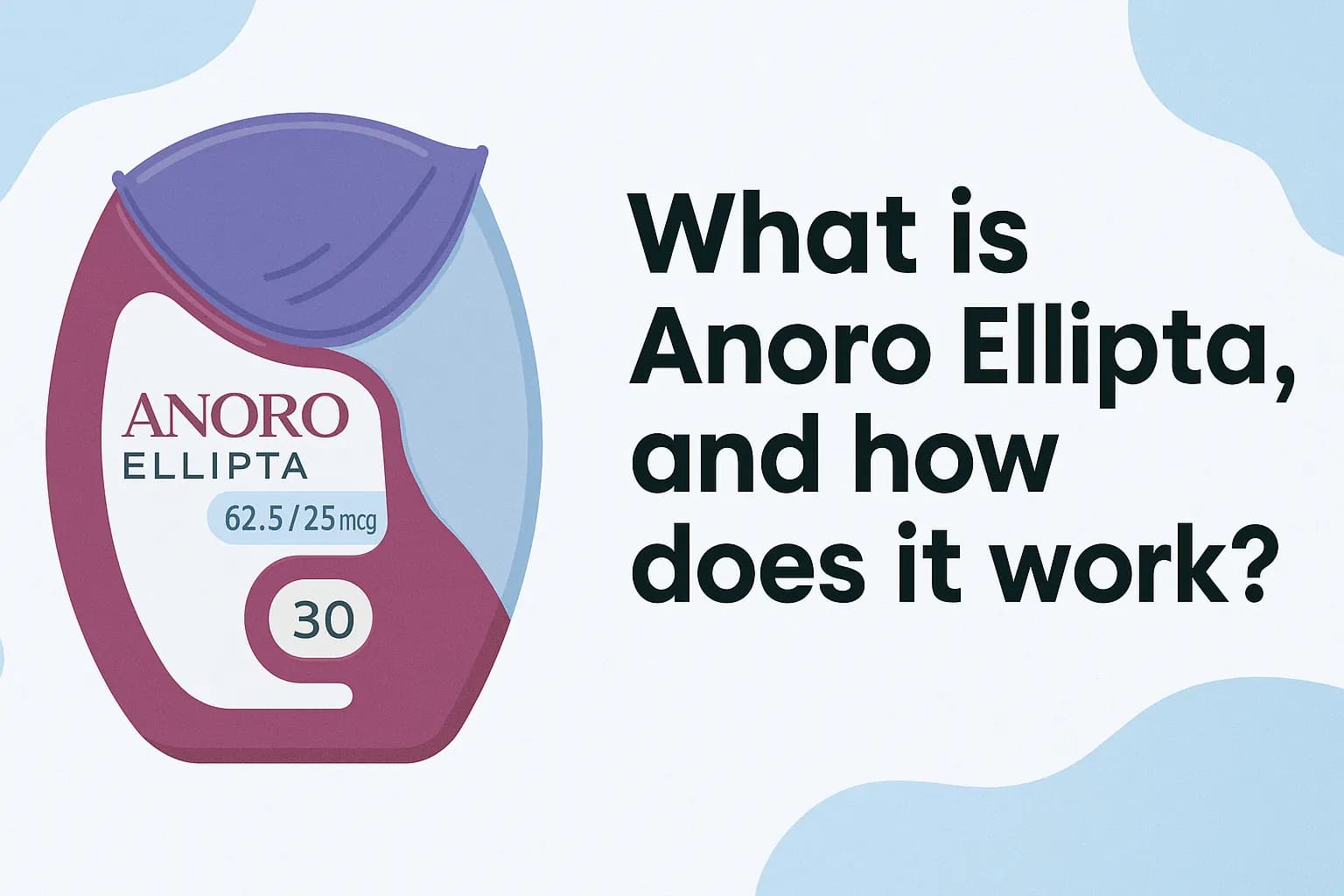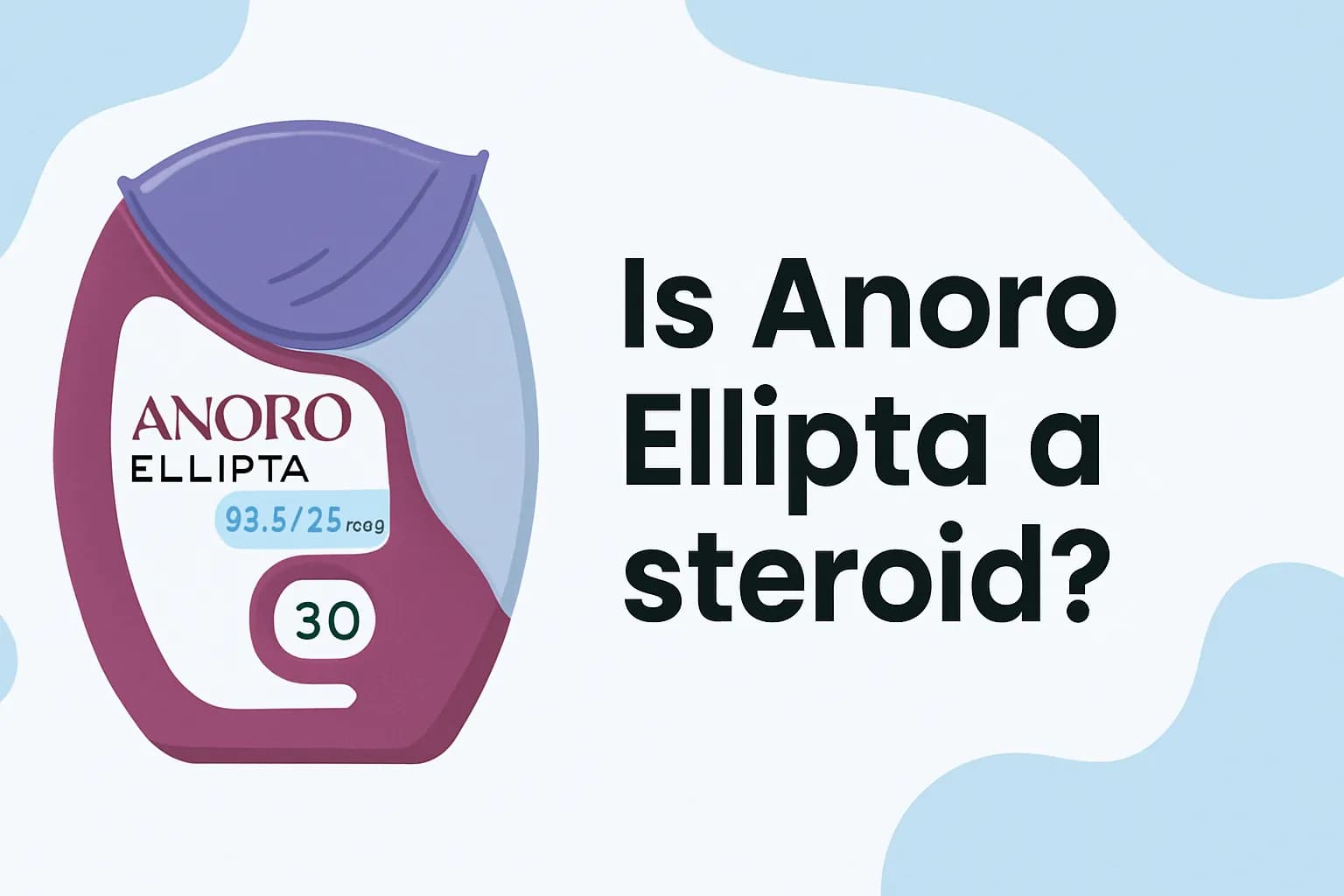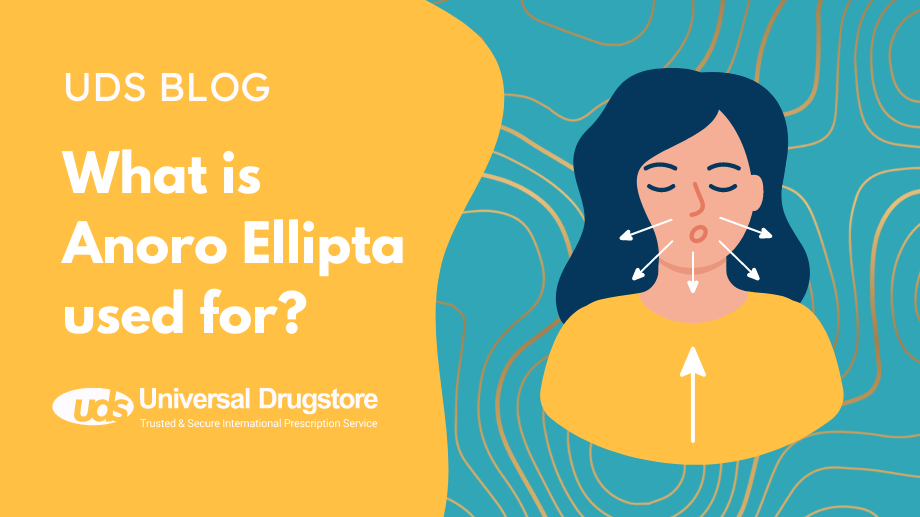What is Anoro Ellipta used for?
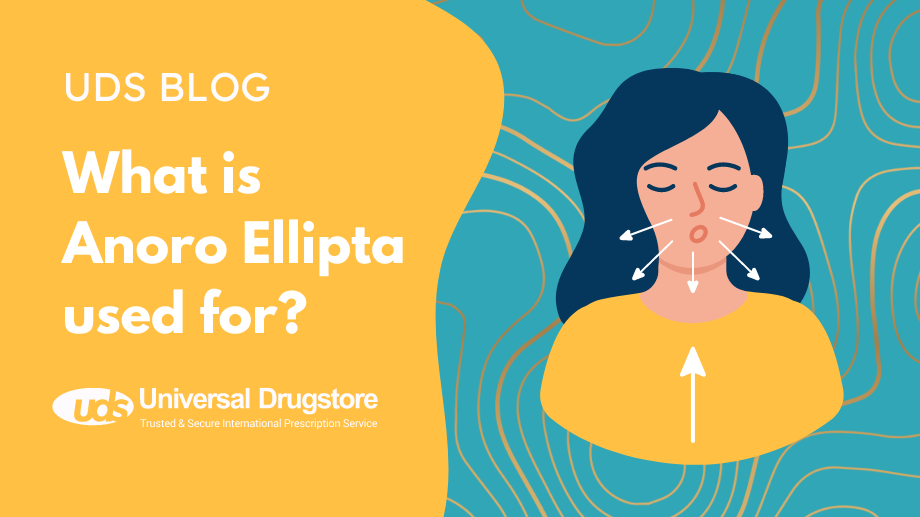
Anoro Ellipta (umeclidinium/vilanterol) is a combination medication that is used for the maintenance treatment of chronic obstructive pulmonary disease (COPD).
COPD is considered a chronic condition because it typically is long-lasting. Most often, it is something you will deal with for the rest of your life. COPD narrows and blocks your airways, making it hard for you to breathe. It was the fourth leading cause of death in the United States in 2018 and almost 6.4% (15.7 million) of Americans reported that they have been diagnosed with COPD. You are more likely to be diagnosed with COPD if you are in any of the following groups:
- Women.
- Aged 65 or older.
- American Indians/Alaska Natives and multiracial non-Hispanics.
- Unemployed, unable to work, or retired.
- Have less than a high school education.
- Separated, divorced, or widowed.
- Currently smoke or used to smoke.
- Have a history of asthma.
The two most common types of COPD are chronic bronchitis and emphysema.
Emphysema
Emphysema is a lung disease that can cause shortness of breath. In people with emphysema, the alveoli (air sacs) in the lungs are damaged. The alveoli help get the air you breathe into your bloodstream. The damage eventually causes the alveoli to rupture and you cannot get as much oxygen into your bloodstream. Also, when you exhale, the damaged alveoli do not work properly and old air becomes trapped, leaving no room for fresh, oxygen-rich air to enter. If left untreated, you may eventually become short of breath even when you are at rest.
Chronic bronchitis
Chronic bronchitis is another common type of COPD. It is inflammation (swelling) and irritation of your bronchial tubes. These tubes help carry air to and from the air sacs in your lungs. The inflammation causes you to lose cilia (hair-like fibers), which typically help remove mucus from your bronchial tubes. The mucus starts to build up, and along with inflammation, it makes it harder for your lungs to take oxygen in and release carbon dioxide out of your body. This leads to coughing and shortness of breath.
What else do you need to know about Anoro Ellipta? Read on as we discuss its side effects, how it works, possible drug interactions, and answer some frequently asked questions.
Anoro Ellipta FAQs
What is Anoro Ellipta?
Anoro Ellipta is a combination medication manufactured by GlaxoSmithKline (GSK). It is approved by the U.S. Food and Drug Administration (FDA) for the maintenance treatment of people with chronic obstructive pulmonary disease (COPD). It is not approved for the relief of acute bronchospasm (asthma attack) or symptoms. Sudden breathing problems should be treated with a rescue inhaler such as albuterol.
How does Anoro Ellipta work?
Anoro Ellipta is an inhalation powder that comes in a preloaded Ellipta inhaler device with blister packs containing measured doses of the medicine. It is used to administer Anoro Ellipta’s two active ingredients: umeclidinium bromide and vilanterol trifenatate. Umeclidinium is a long-acting muscarinic antagonist, which is often referred to as an anticholinergic, It helps relax and open up your airways. Vilanterol is a long-acting beta-adrenergic agonist (LABA) that also helps relax the muscles in the airways, making it easier for you to breathe and reducing the amount of COPD flare-ups.
When is the best time to use Anoro Ellipta?
It is important to follow your healthcare provider’s instructions on how to use Anoro Ellipta correctly. You typically take one inhalation of Anoro Ellipta once a day, at the same time every day. If you miss a dose of this medication, take it as soon as you remember and then take your next dose at your usual time. Don’t take more than 1 dose per day. Anoro should be stored at room temperature (68°F–77°F/20°C–25°C) in its original packaging, until your first use. Once you’ve opened Anoro and removed it from its packaging, keep the device away from direct heat and light.
What are the side effects of Anoro Ellipta?
While Anoro Ellipta is generally well-tolerated, like any medication, it can cause side effects. The most common side effects of Anoro Ellipta seen in clinical trials when compared to placebo include:
- Sore throat (pharyngitis)
- Sinus infection
- Lower respiratory tract infection
- Diarrhea
- Constipation
- Pain in your limbs
- Muscle spasms
- Chest pain
- Neck pain
Other side effects seen with Anoro Ellipta include:
- Common cold symptoms
- Urinary tract infections (UTIs)
- Dry mouth
- Stomach pain
- Headache
- Indigestion
What are some serious side effects of Anoro Ellipta?
While less common, some individuals may experience serious side effects while using Anoro Ellipta. These side effects may require immediate medical attention. If you experience any of the following, contact your healthcare provider or seek emergency medical assistance:
Paradoxical bronchospasm (a tightening of your airways), with symptoms such as:
- Cough
- Trouble breathing after you use your inhaler
Heart problems with symptoms such as:
- Chest pain
- High blood pressure
- Rapid heart rate
- Irregular heart rhythm
- Dizziness
New or worsening kidney problems with symptoms such as:
- Pain while urinating
- Urinary retention
- Urinating more often than normal
Shop Medications
New or worsening eye problems, including narrow-angle glaucoma. Symptoms can include:
- Blurred vision
- Eye pain
- Seeing halos
Hypokalemia (low potassium levels) with symptoms such as:
- Muscle spasms and weakness
- Palpitations
- Irregular heartbeat
High blood sugar levels (hyperglycemia), with symptoms such as:
- Lack of energy
- Increased thirst
- Urinating more often
- Unexplained weight loss
Worsening lung function and COPD symptoms such as:
- Shortness of breath, even when sitting or lying down
- Coughing
- Fatigue
- Wheezing
Serious allergic reactions, which can be life-threatening. Symptoms can include:
- Hives
- Trouble breathing
- Swelling of the mouth, throat, and tongue
These are not all of the possible side effects of Anoro Ellipta. You should always seek medical advice from your healthcare provider for any questions or concerns about your medical condition or treatment. Read all patient information, medication guides, or drug information sheets that come with this medication. You can also report adverse effects to the FDA at www.fda.gov/medwatch or 1-800-FDA-1088.
What drugs should you not take with Anoro Ellipta?
Anoro Ellipta may interact with other medications, supplements, or foods, potentially affecting its effectiveness or increasing the risk of side effects. It is important to inform your healthcare professional about all the medications, including prescription and over-the-counter drugs, vitamins, and supplements you are taking, including:
- Antibiotics such as clarithromycin and telithromycin
- Antifungal medications such as itraconazole, ketoconazole, and voriconazole
- Antiviral medications used to treat HIV or hepatitis such as ritonavir, indinavir, lopinavir, and saquinavir
- Other inhaled bronchodilators that contain formoterol, arformoterol, indacaterol, olodaterol, salmeterol, or vilanterol
- Monoamine oxidase inhibitors (MAOIs) such as phenelzine, isocarboxazid, and selegiline
- Tricyclic antidepressants (TCAs) such as amitriptyline, imipramine, desipramine, and nortriptyline
- Beta-blockers such as atenolol, carvedilol, metoprolol, and propranolol
- Anticholinergic medications such as oxybutynin, tolterodine, ipratropium, and tiotropium
- Non-potassium sparing diuretics such as furosemide, torsemide, hydrochlorothiazide, and chlorthalidone
Who should avoid Anoro Ellipta?
If you have a known allergy to umeclidinium bromide, vilanterol, lactose, or milk proteins, you should not take Anoro Ellipta. You should also not take this medication without an inhaled corticosteroid if you have asthma. Using Anoro alone can lead to an increased risk of asthma-related death.
You should be sure your healthcare provider is aware of your medical conditions before you start taking Anoro Ellipta, including:
- Enlarged prostate or trouble passing urine
- Diabetes
- Heart disease or high blood pressure
- Heart rhythm problems such as arrhythmias or a prolonged QT interval
- Low potassium levels
- Ketoacidosis (high ketone levels in your blood)
- Seizures
- Narrow-angle glaucoma or vision problems
- Thyroid problems
- Liver disease
- Pregnant or plan on becoming pregnant, as it is not known if Anoro Ellipta will harm your unborn baby
- Are breastfeeding or plan to breastfeed, as it is not known if Anoro Ellipta is found in your breast milk and if it may harm your baby
How do you use Anoro Ellipta?
To use your Anoro Ellipta inhaler, you must first breathe out away from the mouthpiece. Then put the mouthpiece between your lips and close them firmly around it. Take a long, steady, deep breath, then move the mouthpiece away from your mouth while holding your breath for 3 to 4 seconds. Breathe out slowly and gently and then close the inhaler and the mouthpiece cover.
Once you have opened the foil tray and started using your inhaler, you will need to dispose of it after six weeks or when your counter reads “0”, whichever comes first.
What should you do if you take too much Anoro Ellipta?
If you think you have taken too much Anoro Ellipta, call your healthcare provider or go to the nearest hospital emergency room immediately if you have symptoms such as chest pain, worsening shortness of breath, shakiness, or increased heart rate.
What should you do if you miss a dose of Anoro Ellipta?
If you miss a dose of Anoro Ellipta, take it as soon as you remember and then take your next dose at its scheduled time. You should not take more than one dose of Anoro Ellipta per day.
Is Anoro Ellipta a long-term use medication?
Yes, Anoro Ellipta is a once-daily prescription medicine that is typically used long-term to treat chronic obstructive pulmonary disease (COPD). COPD can include chronic bronchitis, emphysema, or both. Anoro Ellipta can help you breathe better and reduce the number of COPD flare-ups.
Related medications
- Breo Ellipta (fluticasone/vilanterol)
- Incruse Ellipta (umeclidinium)
- Trelegy Ellipta (fluticasone/umeclidinium/vilanterol)
- Advair Diskus (fluticasone/salmeterol)
- Breztri (budesonide/glycopyrrolate/formoterol)
- Bevespi Aerosphere (glycopyrrolate/formoterol)

